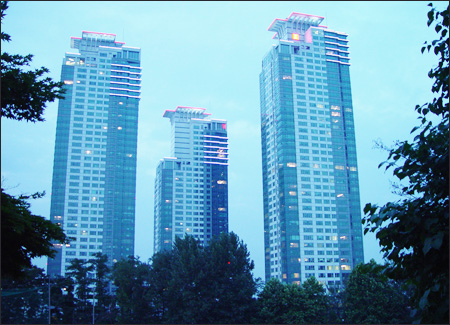Property market swooning

The country’s dismal real estate market has even affected the Hyundai iPark apartments in Samseongdong, southern Seoul, widely considered as the most expensive apartments in the country. A recent auction for a 195-square-meter iPark unit at the Seoul Central District Court was won by a 2.72 billion won (about $2.3 million) bid, which was 36 percent less than its appraised value of 4.2 billion won.
The government has introduced new policies to stimulate the housing market seven times in the past 18 months in an unapologetic display of desperation and kitchen-sink policymaking. But the ongoing dearth of transactions has critics wondering whether officials have been operating on a dead patient.
To get across the sorry state of Korea’s property market, look no further than the affluent neighborhoods of Gangnam, or southern Seoul, where houses have been more overvalued than French wine, the Beatles and New Year’s resolutions combined.
Granted, the houses there are still not remotely affordable to the average worker, not when a mid-sized apartment in Samseong-dong could cost as much as a pop star’s mansion in Beverly Hills. Nonetheless, it’s difficult to ignore that prices have been falling off the cliff.
The Hyundai iPark apartments in the same neighborhood, widely considered the most expensive in the nation, have epitomized the prosperity and posh life styles of Korea’s super-rich, the list of residents heavy with high-profile chaebol bosses and celebrities.
But even iPark can’t avoid discounts in times like these. A recent auction for a 195-square-meter iPark unit at the Seoul Central District Court was won by a 2.72 billion won (about $2.3 million) bid, which was 36 percent less than its appraised value of 4.2 billion won.
It’s now hard to believe, that just before the Lehman Brothers collapse in 2008, property market watchers had thought it would be just a matter of time before the prices of same-sized iPark apartments broke into the 8 billion won territory. Market figures show that the price falls in other Gangnam residential areas have been just as dramatic or sharper.
The government last month announced its latest package of measures aimed at stemming the skid in house prices and helping homebuyers and tenants.
The so-called “May 10” steps can be summarized as the easing of anti-speculation measures imposed on the affluent southern Seoul neighborhoods that keyed the mid-2000s housing boom, lifting price caps on unsold new homes, easing taxes on transfer income and the expansion of state-backed loans for low-income, first-time buyers.
However, policymakers resisted calls by the construction industry to ease lending restrictions based on debt-to-income (DTI) ratios, which limit the borrowing of homebuyers in proportion to their annual income. Critics claim relaxing DTI conditions would be a toxic move for a country where people owe nearly as much money as the entire economy generates in a year.
The newest measures have failed to work as prescribed. House prices in the Seoul metropolitan area, where more than half of the country’s population live, declined for the seventh straight month in May with the fall the most dramatic in Gangnam.
And market watchers are worried that the expanded loans for first-time buyers will worsen the country’s household debt problem without having a meaningful impact on home sales. An increasing number of low-income earners appear to be using these loans to support their day-to-day living or business activities, with their finance options limited by stricter lending restrictions at banks.
“There is an old Korean saying that there are a hundred medicines, but no cure, and I think this is the accurate description of the property market now. For some, it will still make sense to purchase a house, if only for the security provided by home ownership. But people will eventually choose houses like they do apples, they will be searching for the cheaper ones and won’t be willing to take out bank loans to get them,” said an economist from a major commercial bank, who didn’t want to be named.
“The state-backed loans for first-time buyers can only work in times when the housing market is vibrant. In times like these, they only worsen the problems involving personnel indebtedness, or will only increase the house-poor (those who own a home, but are stuck in negative equity) population,” he said.
The BOK puts the household debt mountain at 912.9 trillion won ($794 billion) based on data from savings institutions and other financial companies. When combining the borrowing from self-employed people, the total surpasses 1.1 quadrillion won, compared to the 1.2 quadrillion won the economy made last year.
To an increasing number of observers, it’s becoming obvious that Korean house prices will never reach the heights hit during the market’s mid-2000s boom. Housing bubbles in Japan, the United States and Britain began to pop when household debt in these countries reached 95 percent of their gross domestic product but Korea has long passed that point.
Critics say the country would actually benefit from a prolonged period of slow growth or even falling house prices, as despite the recent drops, the majority of lower paid workers remain shut out of the housing market. Allowing property prices to fall would provide a significant step in helping first-time home buyers and other groups worthy of government support, they say. <The Korea Times/Kim Tong-hyung>
























































